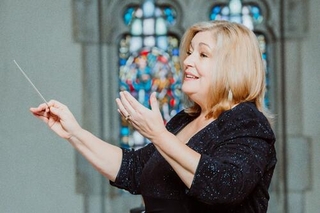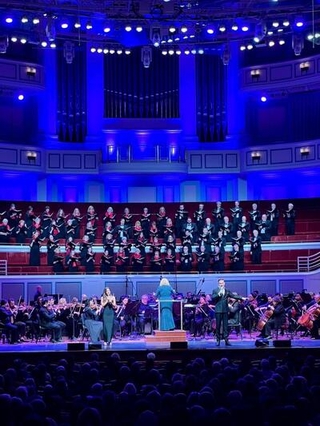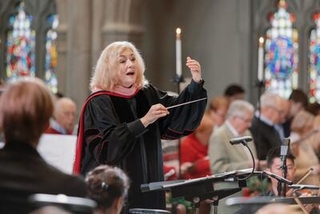Alumni Spotlight: Michelle “Shelle” Louer, MDiv ’95 MM ’95

Dr. Michelle “Shelle” Louer credits the Institute of Sacred Music’s interdisciplinary training for her success as a church musician and arts director. Dr. Louer is Director of Music and Fine Arts at Second Presbyterian Church in Indianapolis, where she combines music, theology, and visual art to create worship music and special events. She is able to bring a multidisciplinary focus to the church’s cultural programs because her mentors at the ISM taught her to examine the context—historical, cultural, and social—of whatever topic she was studying.
Dr. Louer came to Yale from Stetson University in Florida, where she had studied piano and church music but had not formulated a clear career path. Her initial degree program at the Divinity School was the Master of Arts in Religion, despite her parents’ urging to “find something practical.” Although she enjoyed studying theology, she ached for the music that she had set aside. She found a way to combine her interests, completing both an M.M. in choral conducting and an M.Div. in four years. She continued her education at the Jacobs School of Music at Indiana University, earning a doctorate in choral conducting.

Now in her seventeenth year at Second Presbyterian Church, Dr. Louer produces integrative events that emphasize the context around a work of art or an individual creator. In 2019 she organized a three-day symposium on Florence Price, including a multimedia presentation on the Chicago of Florence Price and Margaret Bonds. Her colleague in this endeavor was Second Church’s organist, John Allegar, who also earned a master’s degree at the Institute of Sacred Music before continuing with a doctorate from Eastman. One featured concert in the symposium combined a children’s choir from Second Church with young singers from an inner-city partner church. The children sang a selection of folksongs, followed by the corresponding movements from Price’s Five Folkongs in Counterpoint played by a professional string quartet.
Dr. Lauer led a weekend exploration of Henry Ward Beecher, a nineteenth-century abolitionist preacher (and brother-in-law of Harriet Beecher Stowe) and the first minister of Second Church. Debby Applegate gave a talk, shortly before she won the Pulitzer Prize for her biography of Beecher, and Second Church’s choir sang a musical-theatrical performance of music that would have been sung in churches during Beecher’s time. Dr. Louer finds such events to be an effective way of fostering thoughtful discussions about racism and inequality.
A project on the Prodigal Son reviewed the familiar story over the course of six weeks. Each week a seminar explored the parable through the lens of a different art form, led by a local expert in that art. At the conclusion of the project Dr. Louer asked participants to create a personal artistic response. Three months later a performance and exhibition demonstrated the results: stories, dances, an illustrated cloak, a mosaic, all created by members of the congregation. Dr. Louer attributes such out-of-the-box creativity to her experiences with ISM Colloquium and its wide-ranging intellectual exploration.

Dr. Louer credits Marguerite L. Brooks with inspiring her to learn everything possible about a musical score. She says of Professor Brooks, “Her mind was like a database of music, composers, instruments. The way she curated programs was amazing.” Yet it was the general milieu of the ISM that had the greatest impact. Dr. Louer concluded, “Those four years at Yale literally determined not only my professional pathway but also a perspective and an orientation to the world around me, and people around me, that is priceless.”
—Laurie Ongley